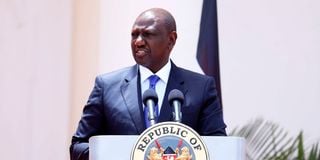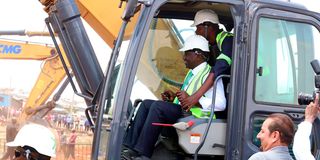Premium
Ruto to go slow on projects as he moves to ramp up tax collections

President William Ruto.
President William Ruto’s administration is under pressure to increase annual revenue collection to Sh3 trillion, as well as increase global remittances by its citizens to Sh1 trillion, amid rising debt and a demand for funding of multibillion-shilling projects.
This has since led Dr Ruto to ask leaders from various regions to bear with his administration as it slows down the roll-out of new projects and decelerates the continuation of the previous regime’s capital-intensive projects, the Nation has learnt.
This was apparent in meetings the Head of State has had with various elected leaders from his political bastion of the Rift Valley, in which he asked them to be patient as the government was not ready to go on a borrowing spree.
Multiple sources who spoke to the Nation yesterday disclosed that the Head of State said his government will not be undertaking any capital-intensive project this financial year.
“Some of the big projects will have to wait because we have a cash crunch. We’re not going to borrow to fund our projects. Therefore, they will have to wait,” one of the MPs quoted President Ruto as saying.
For Dr Ruto, Kenyans have to embrace the culture of saving to help the country fund its developments instead of relying on external loans. He also promised to seal loopholes being used by some people to evade paying taxes.
President Ruto is said to have told the leaders that his Kenya Kwanza administration is currently paying interests which have accrued on loans taken by the previous regime.
“I want to pay the interests which have accrued as well as ensure that our people pay their taxes. The tax base has to be broadened and those who have been evading tax captured,” another source quoted the Head of State as saying.
PPPs framework
The President’s new direction, however, comes even as his government earlier stated it would be pursuing the Public-Private Partnerships (PPPs) framework to undertake capital-intensive projects in the country, so as to ensure it fulfils its development promises to Kenyans while avoiding more debts.
For instance, Water CS Alice Wahome last month said the government was going to build at least 100 dams under the PPP framework, where private capital would be used for the construction of the projects, and then private sector players recover their money through water tariffs.
“Don’t get worried about the issue of the water being expensive because there is also a regulatory body that will deal with the tariffs. We cannot worry about the cost of a commodity that we don’t have. We must first develop the commodity, develop the water resources, have it, and then discuss how much we shall sell it. The rates are different depending on the structure cost, but we should not say that the PPP is likely to push up prices,” Ms Wahome said as she defended the PPP model. This is the same model under which the Sh425 billion Grand High Falls Dam, to be constructed under a partnership between Kenya and the UK, will be delivered, the UK government stated.

President William Ruto operates an excavator machine as he launched the Soweto East Zone B social housing programme in Kibera on October 25, 2022. The project will comprise 4000 houses.
“A water purchase agreement is a new structure that the government is keen to pioneer in Kenya, under which the dam project will provide irrigation water for farmland, and use the fees for irrigation to repay the privately raised funds to finance the construction of the dam,” the UK High Commission in Nairobi said.
When the Nation contacted Nandi Hills MP Bernard Kitur, one of the leaders who was present at the meeting in Eldoret, he confirmed that the Head of State had requested them to help his administration increase revenues by supporting his government’s proposals to expand the tax base.
“Yes, the boss asked us to help him in ensuring that those who are not paying their taxes pay so that we can get funds to finance our development projects,” said Mr Kitur.
KRA target
This comes after President Ruto asked the Kenya Revenue Authority (KRA) to grow revenues by about half to Sh3 trillion by the next financial year.
During KRA’s taxpayers’ day last month, the President was adamant that the taxman must expand the tax base by ensuring every eligible taxpayer is brought on board. He also directed KRA to double current collections in five years.
“Our GDP has risen to Sh12 trillion yet KRA only raised about 14 per cent of GDP in revenues last year. In the past, KRA was able to raise 18 per cent of GDP. If we collect the same target today, then we would have raised an extra Sh400 billion.
“In that case, I expect KRA to raise at least Sh3 trillion by the end of the next financial year and to double the current collection in five years,” President Ruto stated.
And in what seems like a move to seal loopholes at KRA, President Ruto appointed one of his trusted allies, former chairman of United Democratic Alliance (UDA) National Elections Board (NEB) Anthony Ng’ang’a Mwaura as chairperson.
At the same time, the Nation understands that President Ruto is keen to appoint a person who is conversant with his agenda to be the second Deputy Governor of the Central Bank.
Some of the individuals who were interviewed by the Public Service Commission (PSC) for the position include former EAC Principal Secretary Dr Susan Jemtai Koech, Higher Education Loans Board CEO Charles Mutuma Ringera as well as James Teko Lopoyetum, who served as a PS for Water in the first term of the Jubilee administration and former National Bank of Kenya boss Munir Sheikh Ahmed, among others.
The successful candidate is likely to act as the Central Bank governor because the tenures of Dr Patrick Njoroge and first Deputy Governor Sheila M'Mbijjiwe, who were reappointed for a second term in 2019, ending in June 2023.
During the vetting of Principal Secretaries, National Treasury Principal Secretary Chris Kiptoo promised that he will formulate a framework to widen the tax base and increase tax compliance as fiscal consolidation measures.
“I will be joining a team that will be working on a strategy to increase the tax base and we will be looking at income tax for those in formal employment and also VAT which is a consumption tax because there is a lot being left out,” Dr Kiptoo said then.
According to PS Kiptoo, the government will focus on raising the tax base to 20 million individuals up from the current 6.1 million Kenyans
President Ruto had termed the current collections unsatisfactory and indicated that the lack of adequate resources had prevented the delivery of critical projects.
“The implementation of our government’s plan for the rapid and inclusive socioeconomic transformation of our country depends on a robust revenue growth rate and a well-managed budget deficit,” he said.
President Ruto has also promised to grow remittances up to Sh1 trillion. “The data on remittances is an object of deep fascination, and not just because we are proud of the Kenyan Diaspora for remitting over Sh400 billion annually.”




